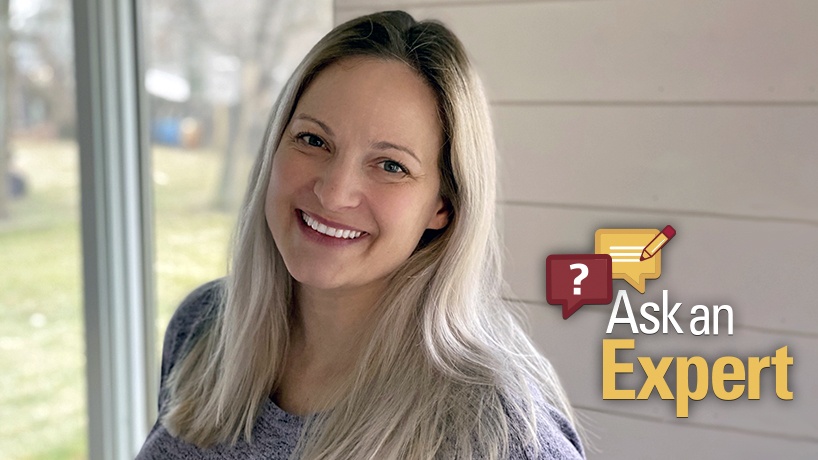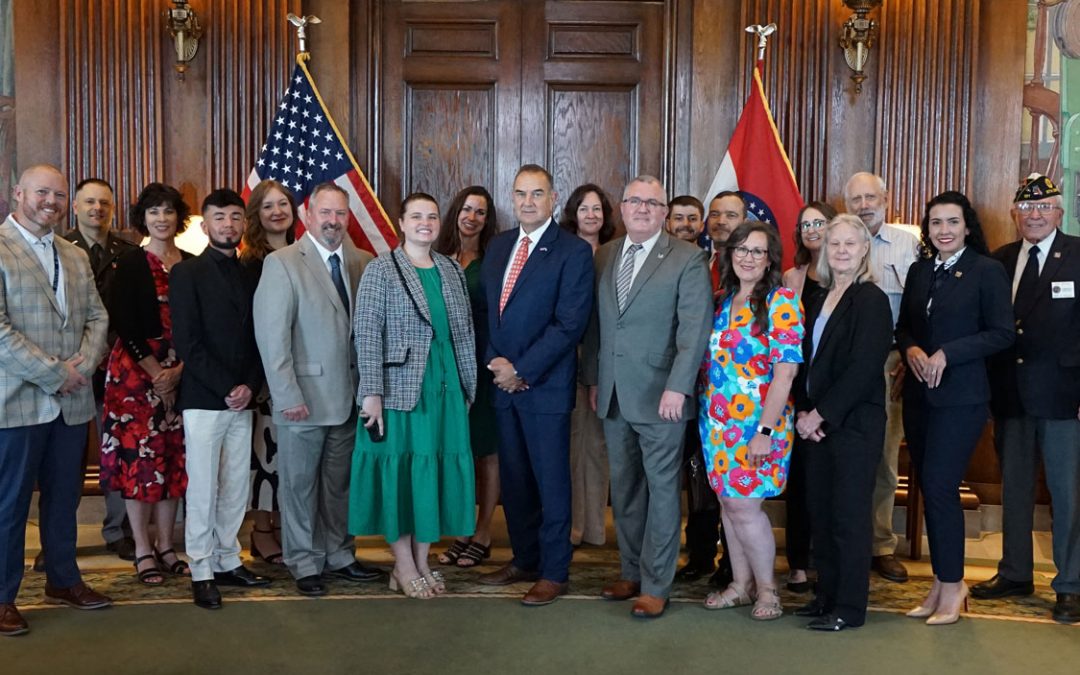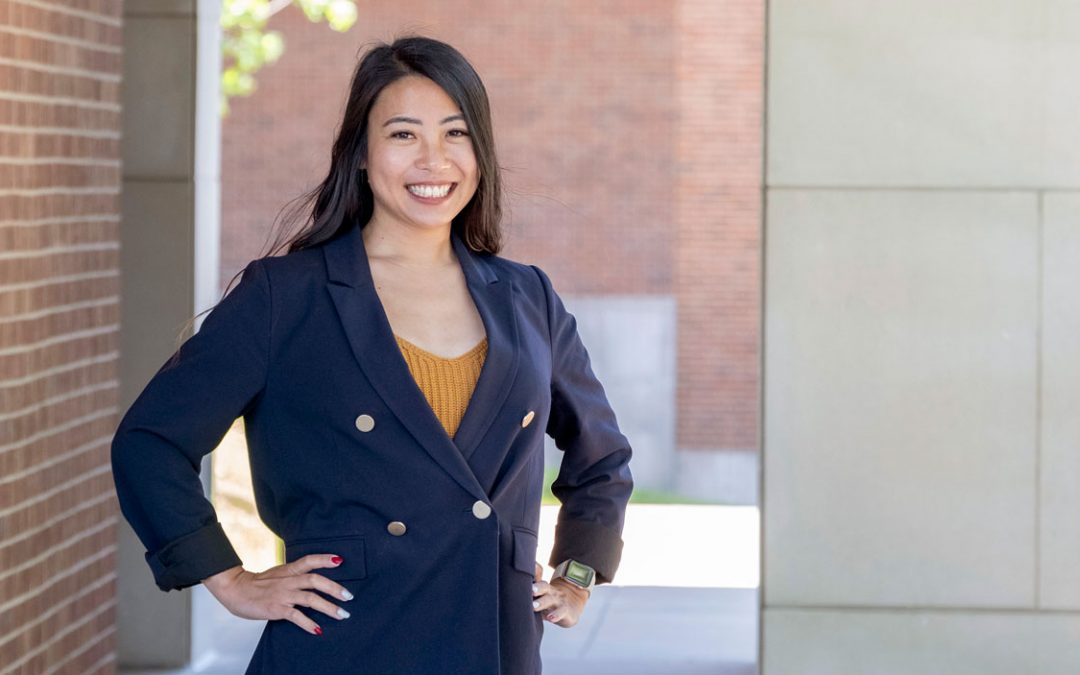
College of Nursing Director of Clinical Operations Shawne Manies discussed the COVID-19 vaccination process with UMSL Daily as part of the ongoing Ask an Expert feature, which reveals faculty expertise. (Photo courtesy of Shawne Manies)
The development and U.S. Food and Drug Administration emergency-use approval of the Pfizer and Moderna COVID-19 vaccines have given Americans a first glimpse into the post-pandemic future. However, the rollout has so far been less than what many hoped for. To understand what’s happened and what the near future holds, UMSL Daily consulted an expert close to home.
College of Nursing Director of Clinical Operations Shawne Manies earned her BSN and MSN from Maryville University and her nursing PhD from the University of Missouri–St. Louis. Before the UMSL assistant teaching professor began teaching full time, Manies worked as a medical-surgical nurse then as a house supervisor for SSM Health. At UMSL she oversees clinical education, and her research interests are in the success of English as a foreign language among nursing students.
UMSL Daily sat down with Manies to discuss the vaccine the day after she volunteered with the St. Charles County Department of Public Health at a mass vaccination event. Along with nearly 100 other providers, Manies helped administer the vaccine to about 1,000 individuals in one day.
What was that vaccination event like?
We were down at the big arena in St. Charles, and we had 22 vaccination stations. There must have been, I’d have to say a good 100 people there volunteering or working. I’d say the majority of that was volunteers. Most of the people getting vaccines were nurses, doctors, paramedics, some police officers. It depends on what they’re doing from day to day at their work. Lots of different people came in, and they didn’t have to wait long. I didn’t hear many negatives from anybody. Everybody was very positive about it. They’re like, “I thought I’d be waiting for hours in line, and it wasn’t that at all.” St. Charles, I feel, put that standard out there on how it how it could be done and done well. I’m hoping that the other counties can follow suit.
How’s Missouri doing on the vaccine rollout?
We don’t have nearly as many vaccines as we would like to have during this rollout, but they are still slowly coming in. I’m hoping that here in the next little bit, the government starts sending even more in.
It sounds like the limiting factor is the supply.
Definitely the supply. Right now, even though the state is telling us we can move along on the tiers, we don’t have enough vaccines to get the first tier done.
How come the state is telling us we can move to those next priorities if we haven’t finished the one before?
I think they probably thought vaccines were going to be coming in quicker, and they just haven’t. We’re in the very beginning phases of this still. I know that a lot of people feel like, “OK, the vaccines are out. We should be done. We should be vaccinated.” It’s going to take a while to get everybody vaccinated.
I think what everybody wants to know is when are they going to be able to get the vaccine. How can individuals make sure they’re staying up to date on when they can receive it?
The biggest thing people can do right now, if they’re not A-1, is to look at their county public health department right now, whichever county you’re in, and sign up for your vaccine there. Sign up at one place. They’re going to get through the list. We’re all trying to help each other, too, so a lot of collaboration and partnerships happening. That’s the biggest thing the general public can do right now.
Have you gotten the vaccine?
I got mine yesterday. And it was like, “Really, that was it?” Today my arm is a little sore, but it’s not even as bad for me as the flu shot was. But, yeah, just a little soreness. I feel fine. Then in 21 days, I’ll go back and get the second one. I’ve heard from some that they had no reaction, but other people had a short-lived but intense reaction. I do hear that the second dose may have more side effects. But I’m still getting it.
When should someone worry that they’re not having a normal reaction?
If they’re short of breath, if they start swelling, they get hives, things like that. That’s an adverse reaction that we don’t want to see. If you have an allergy to certain things that might be in the vaccine, they’re going to not want you to take it. That’s a very small percentage of people that that’s applied to. If you have a severe reaction to the first dose, you won’t get the second.
Sometimes we just have to monitor people a little longer than normal. We do monitor everybody, no matter what, at least 15 minutes after they’ve had the vaccine. Usually, if they’re going to have a major adverse reaction, it’s usually in that first little bit, but some people have had non-serve allergic reactions up to four hours after receiving the vaccine. These are all CDC guidelines. If they have other things going on, sometimes they have to stay longer, like 30 minutes. I had one guy stay 30 minutes because he was on blood thinners, and I just wanted to make sure he was going to be fine, which he was.
Is there going be a cost to the vaccine for anyone?
The vaccine is free for all Americans. It’s paid for by U.S. tax dollars. Some places might charge some sort of administration fee, but so far, I haven’t heard of that happening. I hear no one can be denied the vaccine, though, even if they’re unable to pay.
There’s a short list of people who are in the 1-B phase because of comorbid conditions. I was surprised to see that it was so short. Why those conditions and not others?
It’s not an exhaustive list but rather a good guideline based on the evidence that’s out there. The diagnoses chosen present the greatest risk of morbidity and mortality. Other conditions don’t create as high a risk as those listed, thus far. But the best thing is that any individual can be vaccinated if their physician, based on that specific case, is like, “Yes, you’re getting vaccinated right now. That’s happening.”
If you’ve had COVID, and you’ve recovered, should you get vaccinated?
Yes. The evidence is showing about 90 days of coverage for natural immunity. That could change as we move further into this. But, kind of like we get the flu shot every year, it may end up that we have to get the COVID shot every year. It might not be like getting some of the vaccines we got as children, one time and we’re good to go.
After you get your shots, how long until you have immunity?
It takes a few weeks for your body to start really getting some good immunity. That’s why after the first 21 days or so we get to go back and we do the second shot booster. That will give you the majority of the protection, so you can still get the disease after the first shot, for sure. We’ve had people that’s happened to because it can take four or five days sometimes to get symptoms.
But then at that point, even though you have the vaccine, you could still easily give it to other people, be shedding the virus. That is why we’re still saying you have to social distance, have to wear a mask, all that. Until 70 to 80 percent of the population have been vaccinated, we won’t have that herd immunity. Then, hopefully, that’s toward the end of this whole thing.
What is the vaccine going to mean for higher education?
All our student nurses, they’re included in the 1-A category. The hospitals are wanting to vaccinate our students and faculty that are face-to-face with patients. So that’s great. For higher ed faculty and staff, we’re not the frontline workers. We have been placed in phase two.
When do you think we are going to get back to normal, and what is normal going to actually look like?
Experts are hopeful we will see some normalcy later this year. However, it’s still fairly early, and we need to make sure we have enough vaccines ready and distributed. I think people are going to wear their masks when they’re sick, kind of like they do in some other countries. When they’re sick, or they’re out and about and they don’t want to get sick. I know I will.
What’s your argument for people who are afraid to get the vaccine, either because they think they’re going to get sick from it or because they have an anti-vaccination belief?
One thing to know is that the technology for this vaccine is not new. We’ve been working on it for at least a decade, and it may lead to improvements in other vaccines. I think that the biggest thing we can do – or I can do as a nurse and as an educator – is listen to people. We need to listen to them, sit down with them, let them talk through their fears and why they feel that it is that way. I don’t think me throwing out facts is going to help them feel better. We must first meet people where they’re at before we can gain the trust and make a difference. I do respect that. I think people should always ask questions. That’s healthy. I think the good thing about us is that if a good health care professional doesn’t know the answer, they’re going to write it down and say, “Let me find that information for you.” Of course, there’s going to be things about COVID that we are learning as we go. We’re continuously learning.














